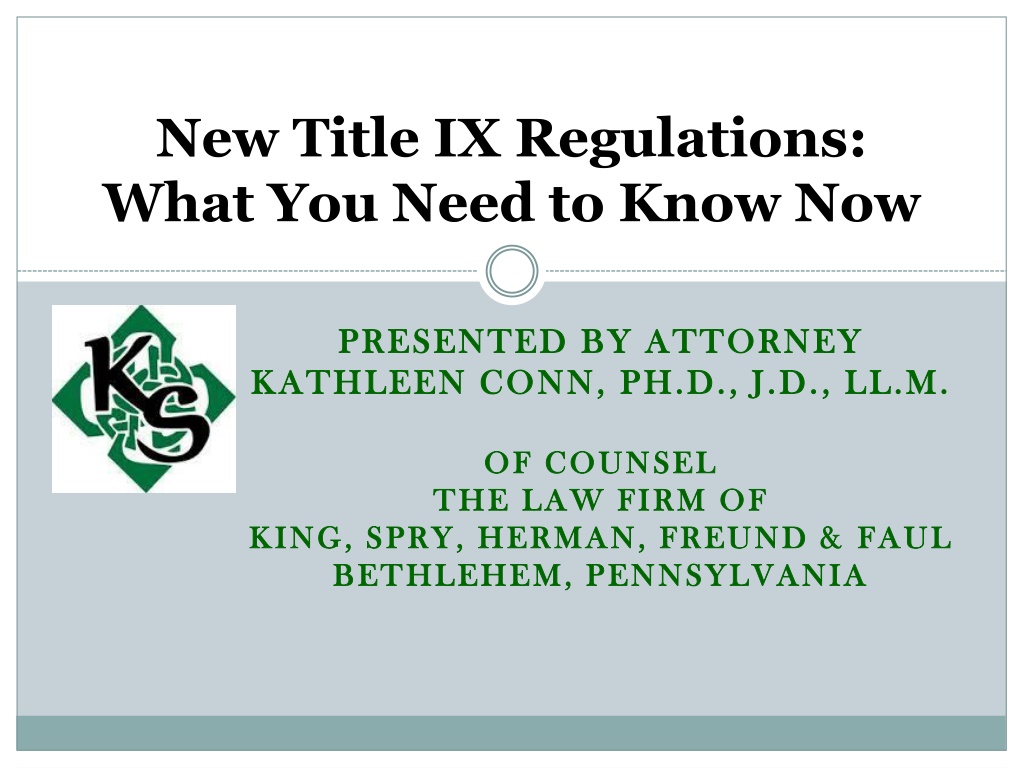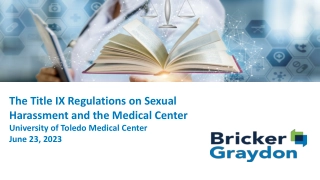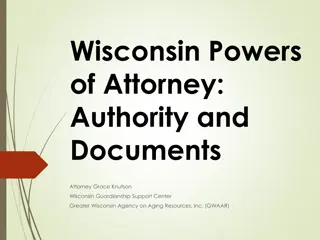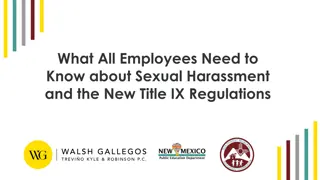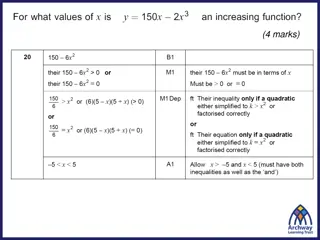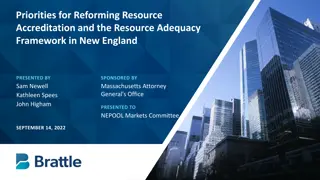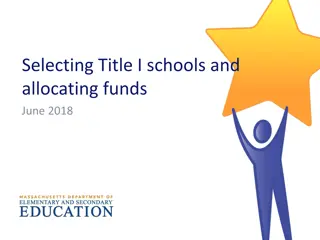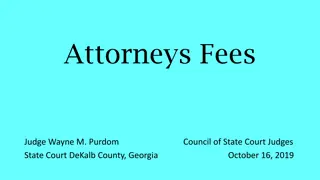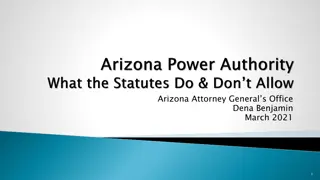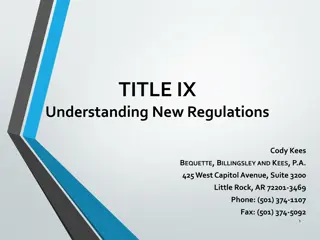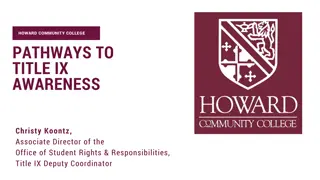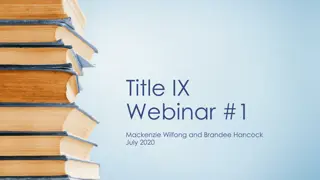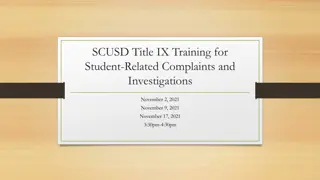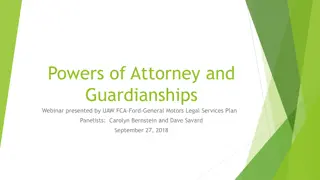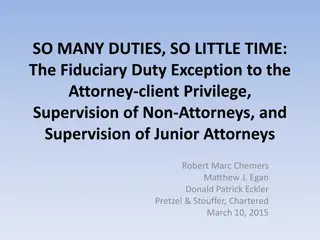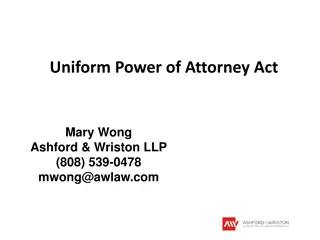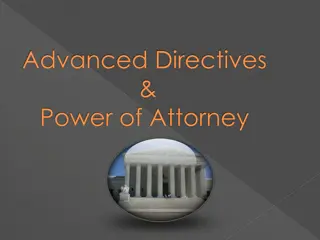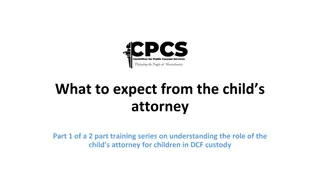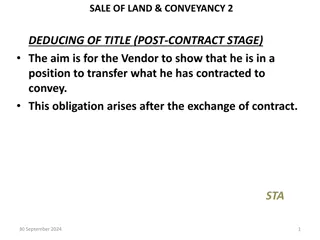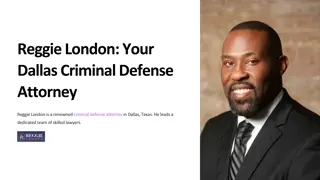Understanding New Title IX Regulations: Key Points Discussed by Attorney Kathleen Conn
Attorney Kathleen Conn delivers a comprehensive presentation on the recent Title IX regulations, covering topics such as the purpose of the regulations, introductions, changes from prior guidelines, Title IX application, coordinators' duties, supportive measures, grievance procedures, investigations, and rights of appeal. Gain insights into the significant aspects of Title IX as it pertains to educational institutions receiving federal financial assistance.
- Title IX regulations
- Kathleen Conn
- educational institutions
- discrimination
- federal financial assistance
Download Presentation

Please find below an Image/Link to download the presentation.
The content on the website is provided AS IS for your information and personal use only. It may not be sold, licensed, or shared on other websites without obtaining consent from the author. Download presentation by click this link. If you encounter any issues during the download, it is possible that the publisher has removed the file from their server.
E N D
Presentation Transcript
New Title IX Regulations: What You Need to Know Now PRESENTED BY ATTORNEY PRESENTED BY ATTORNEY KATHLEEN CONN, KATHLEEN CONN, PH.D. PH.D., , J.D. J.D., , LL.M. LL.M. OF COUNSEL OF COUNSEL THE LAW FIRM OF THE LAW FIRM OF KING, SPRY, HERMAN, FREUND & KING, SPRY, HERMAN, FREUND & FAUL BETHLEHEM, PENNSYLVANIA BETHLEHEM, PENNSYLVANIA FAUL
Purpose This presentation has been designed for the Staff Members of the Lehigh Career Institute of Technology (LCTI) This presentation has been delivered by Zoom on September 16, 2020, and a copy is available for public inspection upon request, at the law firm of King, Spry, Herman, Freund & Faul, LLC, Bethlehem, PA, as required by the 2020 Title IX Regulations
Introductions Kathleen Conn, Ph.D., J.D., LL.M., is Of Counsel with KingSpry, after a career as a HS teacher, K-12 Curriculum Supervisor, and ES Principal in K-12 public schools. Before moving to Allentown, she was a Professor in the Graduate Education Department at Neumann University. She is an experienced investigator and gives presentations in Lehigh Valley school districts on sexual harassment.
What We Shall Talk About Today Title IX and Why We re Here This Morning Reasons for Changes from Prior Guidance An Overview of the 2020 Title IX Regulations How the Title IX Changes Apply to YOU! Information about the Title IX Coordinator s Duties and What a Designee Means Supportive Measures Grievance Procedures Investigations Rights of Appeal and Final Resolutions
What is Title IX? Title IX of the Education Amendments of 1972 is a federal civil rights law which prohibits discrimination on the basis of sex in all federally- funded educational institutions Title IX applies to basically all K-12 schools and postsecondary educational institutions which receive any kind of federal financial assistance
What Is Title IX? Title IX states: No person in the United States shall, on the basis of sex, be excluded from participation in, be denied the benefits of, or be subjected to discrimination under any education program or activity receiving Federal financial assistance.
Who Is Protected Under Title IX? All students in United States educational institutions which receive Federal financial assistance All employees of those institutions The comments to the new Regulations explicitly state that all individuals, including LGBTQ individuals, are protected
Discrimination on the Basis of Sex The Supreme Court interpreted discrimination on the basis of sex as sexual harassment In the past, sexual harassment was considered to be conduct of a sexual nature that a reasonable person would consider to be unwelcome But now sexual harassment has a more specific definition!
Two Ways of Enforcing Title IX Judicially In Court Administratively By reporting to the Office for Civil Rights (OCR) Where OCR/DOJ will work with the educational institution to see that it complies with Title IX The goal: systemic change By suing the educational institution Where the plaintiff must show that a school official had actual knowledge and was deliberately indifferent to sexual harassment The goal: money damages
The Office for Civil Rights (OCR) OCR is a sub-agency of the United States Department of Education Agencies have the power to interpret a law by making Regulations, also called Rules, which then have the force of law However, the agency must go though a process in making those Rules, called notice-and-comment rulemaking
Why New Regulations? Under the Obama administration, schools received significant guidance which was communicated through Dear Colleague Letters However, these letters did not have the force of law, because they were not adopted by notice-and-comment rulemaking When Betsy DeVos took over the U.S. Department of Education, changes were made
New Regulations/New Rule On September 22, 2017, DeVos s Acting Assistant Secretary of Education at OCR rescinded two Obama-era DCLs that said schools had to stop all sexual harassment that they knew or should have known was occurring, and that ALL students, including LGBTQ students, were protected under Title IX OCR promised to issue new regulations that had the force of law
Following the Process OCR published the proposed regulations in the Federal Register on November 29, 2018 and the 38-page document was open for email comments by the public for approximately 2 months OCR received 124,149 comments, and some of those were signed by groups of people In May 2020, OCR published its 2,033-page analysis and discussion of the public comments, and about a week later, published the document as the Final Rule in the Federal Register
Significant Changes in Definition New Definition of Sexual Harassment (1) An employee of the recipient conditioning the provision of an aid, benefit, or service of the school on an individual's participation in unwelcome sexual conduct; also called quid pro quo harassment (2) Unwelcome conduct determined by a reasonable person to be so severe, pervasive, and objectively offensive that it effectively denies a person equal access to the school's education program or activity; or (3) Sexual assault, dating violence, domestic violence, or stalking
What Are Those Third Elements? (3) Sexual assault, dating violence, domestic violence, or stalking These elements of the definition are from the Clery Act, the law that requires postsecondary institutions to report crimes on campus and campus property They are also in the Violence Against Women Act, of which the Clery Act is a part DOE says that these elements are put in the definition to align K-12 and postsecondary requirements under Title IX, and to make schools aware of these as violations of Title IX
Defining the Third Elements Sexual Assault any sexual act directed against another person, without consent of the victim, including instances where the victim is incapable of giving consent Dating Violence- Dating violence means violence committed by a person: A. who is or has been in a social relationship of a romantic or intimate nature with the victim, and B. where the existence of such a relationship shall be determined based on a consideration of the following factors: i. The length of the relationship ii. The type of relationship, and iii. The frequency of interaction between the persons involved in the relationship.
Defining the Third Elements, cont. Domestic Violence felony or misdemeanor crimes of violence committed by a Current or former spouse or intimate partner of the victim, Person with whom the victim shares a child in common, Person who is cohabitating with or has cohabitated with the victim as a spouse or intimate partner, Person similarly situated to a spouse of the victim under the domestic or family violence laws of the jurisdiction receiving grant monies, or Any other person against an adult or youth victim who is protected from that person s acts under the domestic or family violence laws of the jurisdiction
Defining the Third Elements, cont. Stalking engaging in a course of conduct directed at a specific person that would cause a reasonable person to: A. fear for his or her safety or the safety of others; or B. suffer substantial emotional distress
What Do These Four Offenses Mean? All four of these offenses can possibly trigger the responsibility of the school to respond BUT, certain limits apply For example, the authority of the school does not typically extend into a student s home The new definition of sexual harassment is designed to protect students and employees of any school that receives federal funding only under situations where the school has control!
Significant Changes in Definition New Definition of Sexual Harassment (1) An employee of the recipient conditioning the provision of an aid, benefit, or service of the school on an individual's participation in unwelcome sexual conduct; also called quid pro quo harassment (2) Unwelcome conduct determined by a reasonable person to be so severe, pervasive, and objectively offensive that it effectively denies a person equal access to the school's education program or activity; or (3) Sexual assault, dating violence, domestic violence, or stalking
Important Words in the Definition The qualification of severe, pervasive, and objectively offensive applies only to unwelcome conduct That qualification does not apply to incidents of quid pro quo sexual harassment, sexual assault, dating violence, domestic violence, or stalking. A single incident of these other offenses is sufficient to constitute sexual harassment.
Important Words in the Definition In the past, it was confusing to figure out if an educational institution had a duty to respond when sexual harassment occurred outside the school The words effectively denies a person equal access to the school's education program or activity mean that the school has a duty to respond only if the harassment occurs as part of the school s operations; in locations, events, or circumstances where the school has substantial control over the harasser and substantial control over the context in which the harassment occurs
Important Words in the Definition The educational institution has a duty to respond under Title IX only if : (1) The sexual harassment occurs as part of the school s operations i.e., its education program or activities, and (2) In locations, events, or circumstances where the school has substantial control over the harasser and substantial control over the context in which the harassment occurs
What Did NOT Change Sexual harassment can be verbal, written, or physical Sexual harassment can be male-on-female, same sex, child-to-child, adult-to-child, or child-to-adult But with the new definition of sexual harassment, everyone needs to know what the new definition means, AND how the school is legally responsible to respond!!!
Mandated Reporters Mandated Reporters under Pennsylvania law have specific responsibilities Action required under Title IX does not necessarily satisfy the Mandated Reporters responsibilities
So What Does This Mean? Responsibility for Title IX process depends on several important factors, but does not mean other resources are unavailable School codes of conduct may apply Mandated reporting still applies Law enforcement may be an option for the complainant
Reiterate Who Is A Respondent Title IX applies: In locations, events, or circumstances where the school has substantial control over the harasser and substantial control over the context in which the harassment occurs If the respondent (employee or student) leaves school, graduates, or otherwise leaves, Title IX does not apply
And What About the Complainant? An individual shall have status as a complainant only if the individual is participating in, or attempting to participate in, the school s education program or activity, at the time of the alleged sexual harassment Remember: A Title IX lawsuit is a lawsuit alleging that the educational institution is liable
Significant Details The school has no duty under Title IX to respond to off-campus sexual harassment that occurs, e.g., at an off-campus party in a private home The school can apply sanctions under the school s code of conduct, but is not always required to take action under Title IX Also, Title IX only applies to students who are physically in the United States.
Reporting Sexual Harassment In the past , the school s actual knowledge of sexual harassment required that a school official with authority to take corrective action had been notified of the sexual harassment Under the new Rule, if a complaint of sexual harassment is made to the Title IX Coordinator or to any person in the district, the district is considered to have actual knowledge And any individual can make the complaint, even anonymously
Reporting Sexual Harassment A student, parent, caregiver, friend, or a witness of sexual harassment may report sexual harassment This new provision is of special help to younger students who may tell a teacher or even a recess monitor Any person who receives a report of sexual harassment must promptly inform the Title IX Coordinator
The Title IX Coordinator Each educational institution that receives federal funding must have a Title IX Coordinator who is trained in this policy and the Coordinator s contact information must be published widely to everyone in the district, students and all staff, and in the community LCTI s two entities, K-12 and postsecondary, each have a Title IX Coordinator Do you know who is your Title IX Coordinator?
What Happens After a Report? When the Title IX Coordinator receives a report of potential sexual harassment, the Title IX Coordinator must provide supportive measures to both parties, complainant and respondent, as appropriate and reasonable But must take into consideration the wishes of the complainant
Supportive Measures Supportive measures are non-disciplinary, non- punitive individualized services offered as appropriate and as reasonably available, without fee or charge, to both the complainant and the respondent The complainant s wishes have to be considered Such supportive measures must be made available before or after the filing of a formal complaint or where no formal complaint has been filed, in the cases of both student and employee complainants And these may affect you . . .
Supportive Measures Supportive measures shall be designed to protect the safety of all parties and the educational environment, or to deter sexual harassment Such measures may include: Counseling, Extensions of deadlines or other curriculum-related adjustments, Modifications or changes of work or class schedules or locations, Campus escort services, Mutual restrictions on contact between the parties Leaves of absence, Increased security and monitoring of certain areas of the campus
Supportive Measures The Title IX Coordinator must respect the complainant s wishes, and the measures must be kept confidential This is where requirements under IDEA, Section 504, or ADA may be met, for students or for employees Emergency removal may apply to the alleged respondent if he/she is a danger to health or safety Faculty alleged to be respondents may be placed on administrative leave
Title IX Coordinator Duties The Title IX Coordinator must receive training Because of the many duties of the Coordinator, the Coordinator may appoint designees All designees must receive training School administrators may be named designees to assist in handling complaints of sexual harassment AND, even if there is a designee, the Title IX Coordinator MUST receive notice of the complaint PROMPTLY
What Happens to a Report? Once the Title IX Coordinator receives a report of sexual harassment and provides supportive measures, the Coordinator must advise both complainant and respondent of the processes involved in handling a Title IX complaint An investigation may follow Determination ofresponsibility Sanctions Appeals
Title IX Coordinator Duties The complainant must sign a formal complaint on the LCTI complaint form before any process can move forward A formal complaint is the go-ahead permission for an investigation There are three processes for resolution of the complaint, called Grievance Processes Formal Resolution Informal Resolution Live Hearings
Formal Resolution The Title IX Coordinator or designee conducts the investigation Interviews the parties, witnesses, anyone who may have relevant information Basically, the Title IX Coordinator or designee is the fact-finder
Title IX Grievance Processes Formal Resolution Process Informal Resolution Process Live Hearings MAY be held in K-12, MUST be held in postsecondary resolution of complaints Informal Resolution is NOT available for employee-on-student harassment Complainant must sign a formal complaint before the Grievance Process can begin
Title IX Coordinator Duties Explain the Grievance Processes to both parties Conduct the investigation, if Formal Resolution will take place Conduct the Informal Resolution Schedule the Live Hearing, if one will be held Write the investigative report Dismiss complaints on written notice from the complainant or if complaint(s) do not meet the new definition of sexual harassment Keep all records for seven years
Essentials of the Grievance Process Training for all employees involved Presumption of innocence of respondent Prompt time framesfor resolution of the case Allowance for temporary delays for good cause, e.g., law enforcement involvement, rape kit analysis Written notices at all stages of the process, for both parties and advisors No misuse of legally recognized privilege, e.g., physician-patient confidentiality or rape shield laws All training materials available upon request by members of the public
Informal Resolution of Complaints An informal resolution process may be initiated after filing of a formal complaint by both complainant and Title IX Coordinator, e.g. mediation or restorative justice Both parties must voluntarily agree in writing The parties may switch to an informal process even after a formal resolution has begun, and may end the informal process and return to the formal process at any time before agreeing to a resolution
Informal Resolution of Complaints All who conduct informal resolutions must be trained The informal resolution process may NOT be used in cases of faculty-on-student sexual harassment or in cases of any adult employee-on-student sexual harassment
Formal Resolution of Complaints After the Title IX Coordinator receives a formal complaint, the Coordinator must give certain written notices to all known parties: Notice of the allegations Notice about the grievance process, including any informal resolution process Notice that the allegations of sexual harassment potentially constitute sexual harassment, and give parties sufficient time to prepare a response before any initial interview
The Investigation Must be conducted by a trained investigator who can be the Title IX Coordinator or designee, even a contracted investigator from outside the district who is unbiased and free from conflict No timelines are specified in the new regulations, but the investigation must be prompt and unbiased Respondent must be considered not responsible until determined to be responsible
Formal Resolution of Complaints Needs a statement that the respondent is presumed not responsible for the alleged conduct Notice that the parties may have an advisor of their choice, who may be, but is not required to be, an attorney, with them, and that they and their advisors may inspect and review evidence Notice that knowingly making false statements or knowingly submitting false information is prohibited
Formal Resolution of Complaints Prior to completion of the investigative report, the Title IX Coordinator must send to each party and the party s advisor the evidence subject to inspection and review The parties must have at least 10 days to submit a written response, which the investigator will consider The Title IX Coordinator then creates an investigative report and, at least 10 days prior to a live hearing (if a hearing will be scheduled), sends to each party and the party s advisor, if any, the investigative report for their review and written response
Dismissal of a Formal Complaint The Title IX Coordinator may dismiss a formal complaint if the conduct alleged in the formal complaint: Would not constitute sexual harassment even if proved Did not occur in the district s education program or activity The complainant requests dismissal of the complaint in writing If the conduct did not occur against a person physically in the United States If the respondent is no longer enrolled or employed by the recipient Specific circumstances prevent the Title IX Coordinator from gathering sufficient evidence
